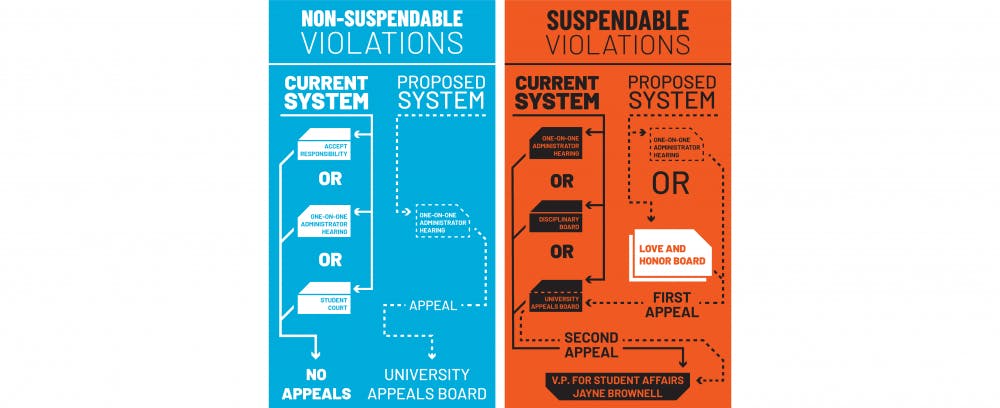Miami University's Student Life Council, will vote next month to approve a massive overhaul of the university's disciplinary process.
This proposal will affect how Miami policy violations, both non-suspendable and suspendable cases (outside of Title IX infractions), are settled. The changes would streamline the process and add the opportunity for students to appeal lower-level violations, but would also reduce how much say students have in how their peers are held responsible.
The Student Life Council advises the Vice President of Student Affairs, a position currently held by Jayne Brownell. The body proposing the changes is the Office of Community Standards (OCS, and formerly known as OESCR).
OSC director Ann James believes that the proposal will eliminate confusion about Miami's disciplinary process and emphasize an adjudication system that is reflective of what OCS stands for: a developmental learning experience.
"There are a lot of options for hearings for students, and what I've heard from students is that it's confusing," James said. "[Depending on] whether their case is suspendable or not, they have different hearing options, and they get this really long email from us when they're charged initially."
In an effort to simplify that initial email next year -- and the rest of the disciplinary process -- OCS has proposed to eliminate Student Court, shorten the number of hearing options for non-suspendable cases, improve the University Appeals Board and rebrand the Disciplinary Board to the Love and Honor Board.
Specifically, OSC is proposing that Miami's interconnected adjudication boards -- Student Court, the University Appeals Board and the Disciplinary Board -- be removed, reformatted and rebranded, respectively.
These changes will be reflected in the updated Code of Student Conduct and will be effective for the 2019-2020 academic year.
The current system
Non-suspendable cases
Right now, if a student violates a non-suspendable Miami policy (the most common of which include alcohol infractions) they are faced with three options:
- Accept responsibility for the violation without meeting with any administrators.
- Sit down for a one-one-one administrative hearing with an OCS or ORL officer (the distinction between one or the other depends on where the violation took place -- in or out of the residence halls).
- Have their case heard in front of five to seven members of Miami's Student Court.
Enjoy what you're reading?
Signup for our newsletter
Currently, students can't appeal the outcomes of any of these three options.
Suspendable cases
Students currently facing suspendable violations currently must either:
- Sit down for a one-one-one administrative hearing with an OCS or ORL officer.
- Have their case heard by the Disciplinary Board, which comprises three OCS faculty and/or staff members and two student representatives per hearing.
If students feel as though the outcome of their case for a suspendable violation is wrong, they have the opportunity to first appeal their case to the University Appeals Board, and if they disagree again, to the Vice President of Student Affairs Jayne Brownell.
Under the current system, three main bodies supervise and ultimately decide how a student who violates the Code of Student Conduct will be held responsible: Student Court, the Disciplinary Board and the University Appeals Board.
There are 14 students on Student Court this year. They were chosen by OCS after submitting applications and going through two rounds of interviews, junior and Student Court outreach coordinator Madeline Witte said.
Over the last three years, the number of students who requested to have Student Court hear their case has dropped -- from 109 throughout the 2016-2017 academic year to 59 requests made so far this year, according to OCS records.
Miami's disciplinary and appeals boards each comprises a pool of 13 student representatives chosen by the Associated Student Government student body president. Currently, there are 13 students on the appeals board, and 12 of those 13 also serve on the disciplinary board.
While the proposed system will abolish Student Court and rebrand the Disciplinary Board to the Love and Honor Board, Witte is not concerned.
"All of the people who are on court have the opportunity to move to the Love and Honor Board," she said. "I think the Love and Honor Board is a really good thing that allows us to be reflective of OCS' values."
The proposed system
Non-suspendable cases
In the proposed new system, there will be only one option for students who commit non-suspendable offenses:
- Sit down for a one-one-one administrative hearing with an OCS or ORL officer.
However, students will have the option to appeal the outcome of that hearing to the University Appeals Board. But there is no opportunity to appeal the appeal, which differs from suspendable cases.
Suspendable cases
Students who violate Miami policies that could carry the penalty of suspension will have two options to deal with their charges:
- Sit down for a one-one-one administrative hearing with an OCS or ORL officer.
- Have their case heard by the Love and Honor Board, which comprises two OCS faculty and/or staff members and one student representative per hearing.
This process is similar to the current adjudication system for suspendable cases, with two notable exceptions being the rebranding of the Disciplinary Board to the Love and Honor Board and the downsizing of five board members hearing a case to three.
Students will still have the opportunity to appeal the decisions from either of these processes to the University Appeals Board and they can appeal that appeal to Brownell.
Future of disciplinary process
OCS' Division of Student Life Assistant Director and Student Court adviser, Larissa Marple, said the main differences between the current and proposed system -- when it comes to non-suspendable and suspendable cases -- are threefold: here will be no more Student Court, there will no longer be an option to accept responsibility without meeting with an officer and the Disciplinary Board is being rebranded to the Love and Honor Board.
The Love and Honor Board will function similarly to the current Disciplinary Board, but there will not be as many representatives (students, faculty or staff) listening on individual hearings, Marple said.
Additionally, if Student Life Council approves the proposal, OCS will change the selection process for the University Appeals Board,, and the student members of the appeals board will also serve on the Love and Honor Board.
In this case, ASG student body presidents will no longer have the power to appoint student representatives to the University Appeals Board.
"The current system is not consistent with the educational and developmental philosophy of our process," James wrote in an email to The Student. "So we are remedying that by ensuring that all students speak with someone about their case. Also all students will have the right to appeal the outcome and/or sanctions of their case."
Student Life Council will vote on the proposal in April, and Miami's general counsel office will have the final say before any changes are written into into the Code of Student Conduct.




